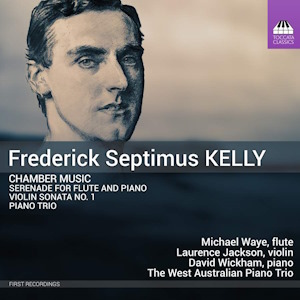
Frederick Septimus Kelly (1881-1916)
Violin Sonata No.1 in D minor (1901)
Serenade for flute and piano, Op.7 (1911)
Piano Trio (c.1905)
Laurence Jackson (violin)
Michael Waye (flute)
David Wickham (piano)
The West Australian Piano Trio
rec. 2021/22, Crank Recording, Perth, Western Australia
Toccata Classics TOCC0702 [65]
Toccata already has a Frederick Septimus Kelly solo piano album to its name so this disc of his chamber music – all heard in first performances – sits attractively alongside it. Kelly was one of Australia’s most grievous artistic casualties of the First World War, killed in one of the last battles of the Somme on 13 November 1916, three months after Britain’s greatest musical loss of the war, Kelly’s slightly younger contemporary, George Butterworth.
Unlike Butterworth, Kelly studied on the continent at one of the then most favoured conservatories, Frankfurt. The Violin Sonata in D minor, however, predates his 1903-08 period in Germany and was composed during his first year at Oxford where he studied Modern History. It’s not to be confused with a later work, the ‘Gallipoli’ Sonata of 1915, which is now available from two different labels, Hortus (review) and EM Records (review). Laurence Jackson and David Wickham play this 1901 sonata with admirable sympathy and Jackson’s little period devices, such as supple portamenti, are deployed with apt intelligence. Kelly was only around 20 when the sonata was composed and one can forgive a certain clumsiness of architecture and a predilection for overusing certain devices, such as the heavily dappled piano writing in the first movement. There’s a confident, clean-cut quality to the writing but though there’s a quality of pathos in the central movement, its manly, rhapsodic quality isn’t sufficiently expressive to balance the outer movements and I have to say the pizzicati-against-single piano note passage is simply insipid. In the finale the ethos is Mendelssohnian cum Brahmsian, though overuse of repeated figures again works to the detriment of the sonata. Both musicians do the very best they can with this pre-student work.
On a voyage home from England to make his Sydney debut in 1911, Kelly met the eminent flautist John Lemmone, Nellie Melba’s manager, for whom he wrote a Serenade for flute, with harp, horn and string orchestra. This recording is in the authorised arrangement for flute and piano. It’s a charming piece in five ‘antique’ sounding movements, orientated towards the baroque but also, most especially in the opening Prelude, showing an affinity with the prevailing aesthetic for aerial Gallic writing. The Idyll is the most harmonically interesting section and the longest movement, again showing clear French elements. It’s good to have the Serenade in this attractive performance from Michael Waye and Wickham.
The final work is the c.1905 Piano Trio, but its two surviving movements show that it’s a torso. The opening Lento is a quite extended and richly conceived romantic affair followed by the Slavic frolics of a Scherzo and Trio that Wickham in his booklet notes, quite rightly, says show an appreciation of Smetana and Dvořák. Perhaps the fact that the latter composer died in 1904 allowed Kelly to pay this tribute. It’s played with great commitment and zest by the West Australian Piano Trio.
The booklet is full of pertinent notes and supports a good recording in Perth, Western Australia.
Jonathan Woolf
Help us financially by purchasing from





















